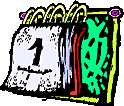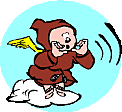With The Commentary of the RABAM


Rabboisai,
You should be very thankful this week that I am sending you your weekly Toirah fix. After all, I am very busy these days, barricading myself on roofs, throwing bricks and oil at my soldier brethren, and waiting for the Moshiach to come.
Barricading on roofs = A means of distancing oneself from the land. Gaining perspective, and reaching higher. The oil perhaps to encourage the brethren to get smicha (ordination, from a word that refers to oil), and the bricks to rebuild the Beis HaMikdash. In the spirit of gentle reproof so characteristic of our discourse – because we are different from the nations. And sensitive to the symbolic meaning of acts.
Plus, protesting is a GREAT WAY to meet hot settler women! Boruch Hashem, I love the big hoop skirts, although the sleeves are too short on the orange t-shirts. Too bad some of the maidelach didn't have time to go shopping in Afghanistan before the protests.
Orange t-shirts = Tee-shirts, because it is midsummer, and hot. Orange, because they’re secretly supporters of the Dutch monarchy. How the Ollandim got associated with the Eretz-ha-Shlema crowd is baffling. Perhaps because the Dutch were once seen as the most efficient of all imperialists. And they invented modern investment capitalism. There is much obscure symbolism here, this passage hott eppes tiefe shaile.
Afghanistan = A barren land on the silk road, once a flourishing intermediary zone between Persia and the Persian-speaking Turkic states of Central Asia. Southern and South-Eastern Afghanistan speak Pashto, Northern and North-Eastern Afghanistan, as well as the capital city Kabul, speak Dari, which is a local variation on Persian, closely related to Tajiki. Turkic dialects and a few extremely odd languages are also spoken in parts. All these languages borrow profusely from Arabic, to such an extent that one cannot even make oneself understood without the Arabic borrow-words. And Arabic, as we know, is spoken by Edom. And Eisav. And probably even Amalek. Not that you should jump to any conclusions. Baruch Hashem.
Some Pashtoon tribes claim descent from Jewish ancestors who converted to Islam, while others aver that they are the kin of boon-companions of the Prophet. And many have a cavalier approach to religion, as illustrated by the following maiseh shehoyo: Long ago a very saintly religious scholar came to live among the Afridi tribe. The Afridis welcomed him with great honour, and asked him for his blessings, but instead he lambasted them as irreligious, heretics, apikorsim. Why, in all their land, there was not even one holy site, not one sacred area or shrine, not even one tomb of a saint at which they could pray!
The Afridis were so swayed by his argument that they killed him right then and there, and built a most impressive mausoleum to house his remains, at which they devotedly pay their respects to this very day.
Even teaching apikorsim has its rewards.
Afghanistan is where the best all-encompassing potato-sack dresses are made, which are much appreciated in climates were sheitels are too hot for mid-day wearing.
But sometimes a shapeless mass can be VERY alluring, oh tasty bag lady!
We are told in the teachings of the ARI ZAHL that during Creation, the world did not reach the desired state of perfection due to a cosmic accident, a shattering of holy vessels -- so to speak -- that resulted in the sprinkling of holy sparks that were lost amongst the base dross of existence. The mission of Klal Yisroel, and of mankind, is to rescue these lost holy sparks through acts of Tefillah, Teshivah, and Tzedakah. In so doing, we emulate the nature of Hakadoshboruchhu and bring about the completion of the world.
Cosmic accident = Which is how by Kabalah the world of existence came into being – pots were dropped. This they should teach as intelligent design. Not that tserdraite story about the fruit and the snake… which is one hundred percent factual, by the way. 100%!
Holy sparks that were lost = Which are encased in husks (klipos). It is said that some remain mere husks, while others are, by their luminous Yiddishe natures, in eternal relationship to each other, as they were at Sinai.
Tefillah = Prayer. As in the first aliyah of Parshas Va-etchanan (And I Beseeched), which you do not deserve, you minuval, wherein Moishe beseeches the Lord. The Medrash Rabba in discussing that aliyah quotes Rabbi Yochanan, who says “Torah uses ten different terms to describe prayer” – yet the term Tefillah is not among them! Why is this?
The Sfas Emes explains the ten terms that the Medrash lists as not being prayer itself, but the hachanois (preparations) for prayer – methods and advices (derachim va eitzois; paths and aids) with which one can reach a state of contact with HaShem.
Prayer is of two types: silent prayer, and prayer said aloud. It says regarding Channah in Shmuel (Samuel) 1: 13 “Ve Chana hi medaveret al leiba rak, sfateiha na'ot, ve kola lo yishamea …” (And Hannah, that spoke in her heart, her lips moved, yet her voice could not be heard…). From this we learn that one may pray silently.
Eli, witnessing her thus, presumed her drunk, because he did not hear her speak, and was accustomed to spoken prayer, as was usual in that age (according to Rashi).
Many give voice when davening, but Chazal question whether one may even pray aloud, as loudness is equated with arrogance. If the heart and the mind are both involved,, what need is there for the tongue?
Teshivah = Return, repentance; to requite, to answer. As it says in Tehillim 90:3 “Tashev enosh ad daka va tomer shuvu bnei Adam” (You cause man to repent, saying ‘return oh son of man!’). Not only on Yoim Kippur should you repent, but every day – seek to improve yourself at all times. Life is about progress, not stasis.
Tzedakah = Righteousness. Generally speaking, this is doing good, and being a good person. But more particularly, being charitable.
Why must we be charitable?
It says in Dvarim (Deuteronomy) 15:7 “ki yiye vecha eviyon me achad acheicha b’achad sha’areicha be aretzeicha, asher Adonai Eloheicha notenlach, lo teametz et levavcha ve lo tikpotz et yadcha me achicha ha eviyon” (If there is a needy man among you, a brother, in one of your gates, in the land which the Lord your G-d gave to you, do not harden your heart, nor shut your hand to your needy brother).
The Rambam (Rabbi Moishe Ben Maimon) lists eight ways of charity: employing the poor so that they will not need handouts, giving anonymously to someone unknown, and giving anonymously to someone who is known (in either case so that the recipient is not shamed), giving to a stranger (and thus not favouring only those whom you know), giving before it is asked for, giving what is needed, giving not enough, and giving grudgingly. Clearly the first way is the best, the last the least – but to give is nevertheless a blessing.
Why must we be charitable?
Perhaps the best argument is that we do it not for the other person alone, but for ourselves as well. By giving, we acknowledge our kinship to others, even to people we clearly do not know, and we give expression to our humanity. Charity is not arrogant, it benefits the soul of the giver. Righteousness restores balance to the world.
Yeshayah 54: 14 “B’tzedaka tikonani rachaki me’o shek ki lo tirayi umimchita ki lo tikrav elayeich” (In righteousness you shall be founded, and be distant to oppression, so that you will not fear, and that ruin will not come to you). Yeshayah 1:27 “Tziyon be mishpat tipade, ve shaveiha bi tzedaka” (Zion shall be redeemed through justice, and those that return by righteousness).
Bring about the completion of the world = Both Tikkun Olam (repairing the world), and by doing as Hashem has commanded making the world whole.
I do not recall it saying anywhere in the writings of the ARI ZAHL that we should emulate the Aimishteh by throwing acid on Israeli soldiers. Or that we should threaten them with guns. Or that we should randomly kill people of whatever faith. Maybe I missed Yeshiva that day -- there was a Catholic girls' high school a block away after all, and, like I said, I really do dig long skirts.
Especially with a tartan pattern. On a hot shiksa.
Arizal = The Holy Ari, Rabbi Yitzhak Ben Shlomo Luria (1534 – 1572) of Tzfat (Safed), a Kabbalist master and sage whose influence on the subsequent development of Jewish mysticism is scarcely second to that of Madonna. He was a student of Rabbi Dovid Ben Zimra and Betzalel Ashkenazi, and a teacher of Rabbi Chayim Vital Calabrese, who documented all his teachings that have come down to us.
David Ben Zimra = The Radvaz; Rabbi David Ben Shlomo Ibn Abi-Zimra (1480 – 1573), a Talmud scholar, and chief Rabbi of Egypt.
Betzalel Ashkenazi = With whom Rabbi Yitzhak collaborated on a text on Tractate Zvachim called Shitah Mekubbetzes, being a systematic collection of notes from the Rishonim. Among others, Tosfois, the Rosh, Rabbeinu Baruch.
Catholic girls' high school = Both a blessing……, and a curse.
Tartan = A form of camouflage pattern formerly favoured by hairy tribals in the mountains of Scotland, now a fashionable style choice that makes Catholic girls look adorable. Woolen pleated plaid skirts!
Perhaps that one day I missed in all my years in Yeshiva they gave a date and an address for the Moshiach, and that address was Khan Yunis. Funny, I always thought that the Moshiach was going to land in Boro Park and have a quick slice and a coke before altering history. Oh, and maybe pick up a few sefarim while he was there.
Khan Yunis = Johnny’s hostelry. The name of a town in Gaza which has grown enormously since the establishment of the state of Israel. Yet the locals have their doubts about that being such a blessing.
Boro Park = Neither Williamsburg nor Crown Heights. A suburb of Tel Aviv.
Sefarim = The plural of book (sefer), what the sofer (scribe) has wrought. A common reference to all Hebrew language books on Jewish religious topics.
Yes, we must all feel empathy for our displaced brothers and sisters. But the disturbing events of this week perhaps tell us that while many of my Rabbinic colleagues were busy searching for the lost holiness and convinced that they were the Keepers of the Flame, rather than finding holy sparks they instead created more dross.
Shabbos is the day for the DOUBLE MITZVAH. It is also a time for introspection. I hope that these Rabbinic colleagues will spend the day evaluating their actions and their beliefs, and realize that even when we have the grandest intent we sometimes deliver unexpected and unwelcomed results. Even the Reboinoisheloilum broke His holy vessels.
Double Mitzvah = For the benefit of the adolescent bucherim among you, who are easily excited, let me clarify that this is a reference to making bread – the mitzvah of challah being uniquely appropriate for women.
And we do like buns.
As it says in the Kitzur Shulchan Aruch (chapter 72:6, on Shabbes at home, it gives the aishes chayil an opportunity: “And make (it) three times: a bigger, a medium, and a smaller. The medium for the evening, the big one for during the day, and the kleinikeit to satisfy last”.
I, on the other hand, have a clear conscience, and plan to spend the whole day doing the DOUBLE MITZVAH.
A clear conscience = “…And some customarily recite the Shir HaShirim afterwards”. We are also told that some complete it ten times, others seven, but under no circumstances less than two (chapter 75:2).
You must take a bath beforehand (chapter 72:13), and clip your nails (chapter 72:14).
Clip your nails either Friday morning, or Thursday evening, lest they grow on Shabbes. Which would be melacha.



